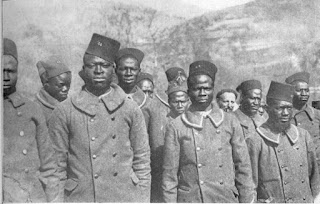The fourth chapter of Niall Campbell Douglas Elizabeth Ferguson's (More) Civilization (Than You Deserve) is allegedly a discussion of the fourth "killer app" of Western civilization, medicine. An unwary reader might expect this to be an essay on medical science, focusing on breakthroughs like Jenner's smallpox vaccine. Those familiar with Professor Ferguson's style and beliefs will not be surprised to learn that it is instead a defense of European imperialism, with particular emphasis on its French variant, bookended by a gratuitous denunciation of the French Revolution* and an account of the First World War (about which Ferg says, with admirable originality, "War is Hell" [p. 187]). On the main subject of his chapter, Niall-o declares that French colonial public-health policy is a good answer to "those like Gandhi who maintained that the European empires had no redeeming features" (171). Through mandatory smallpox vaccination, the development of a yellow-fever vaccine, and the draining of malarial swamps, French officials significantly increased life expectancy in their African and Indochinese colonies, nearly doubling life-expectancy in the latter region between 1930 and 1960. There was certainly a downside to French health policy, Ferg admits, insofar as French officials used disease control as an excuse to segregate French colonists from the indigenes, thereby undermining the racial egalitarianism of their imperial vision. On the whole, however, the French imperium was the model of a good European empire, while the German empire in sub-Saharan Africa, with its draconian laws and exterminationist wars, was the model of a bad empire.
One must offer Ferguson some light praise for resisting the urge to write about one of his most favorite subjects, the British Empire, light of the world and land of the palm and the pine. One may then damn him for implying that there is such a thing as "good" imperialism. Every empire rests on the same original sin: the idea that there are certain races or ethnic groups or nations who are unfit to govern themselves, and who must therefore surrender their agency and destiny to another people. In theory, colonizers might be acting from benevolent intentions, such as the French "mission civilisatrice." In practice, imperial power attracts the cruel and the greedy, and empires therefore tend to become primarily instruments of exploitation. Ferguson acknowledges that European medical researchers weren't initially acting from benignly paternalistic motives: they were more interested in the survival of Europeans in tropical climates than in the well-being of colonial peoples. They focused their research on diseases that most affected Europeans, like malaria, rather than those that killed Africans, like "cholera and sleeping sickness" (174). Prof. Niall is less ready to acknowledge that colonial public health programs did not begin to affect colonized peoples' death rates until rather late in the colonial period - the 1930s and '40s - and that their primary goal, other than preventing the spread of disease to European settlers, was to ensure healthy workers for European mines and plantations and healthy soldiers for European armies.
Like other apologists for empire, Our Man Niall claims that policies intended to facilitate European exploitation were in fact enacted for the benefit of the "natives" - e.g. his observation that the French blessed Indochina with "20,000 miles of road and 2,000 miles of railways...coal, tin, and zinc mines, and...rubber plantations" (191), as if these were schools or cultural centers instead of money-making enterprises using cheap land and cheap labor. The positive effects of imperialism were fig leaves covering up the primary function of empire, which was to enrich a few Europeans, give the European lower and middle classes a false sense of racial superiority, and impoverish much of the world's population.**
Ferguson's imperialism is perhaps less obnoxious in this chapter than in his previous work about the British Empire (e.g. Empire, 2003) but it is still present, and one must wonder why. Partly, I think, Niall-o is still a British nationalist at heart, and longs for the days when Albion ruled 40 percent of the globe. There has also long been a strain of imperialism in Anglo-American conservatism that Ferg probably caught when he was a young Tory. This strain manifested itself in James Burnham's Suicide of the West (1964), which mourned the breakup of the European empires as a loss of territory by the Free World to the Communists; more recently, it appeared in Dinesh D'Souza's and Newt Gingrich's denunciation of Barack Obama's father for his "anti-colonial" views, which both men viewed as somehow anti-American. Ferguson's celebration of empire is a necessary compliment to this anti-decolonizationism. Finally, I suspect Professor Ferguson embraces pro-imperial views as something of a posture, an effort to appear contrarian, cheeky, and clever. What he forgets is Scalzi's Law: "The failure mode of clever is asshole."
* Our Man Niall does argue, in contrast to scholars like Simon Schama, that much of the violence of the French Revolution was a product of the French Revolutionary wars, not of the French Republicans' ideology.
** George Orwell observed that a penny was a common hourly wage in British India before the Second World War, and that an Indian laborer's leg was often thinner than a British person's arm.
Subscribe to:
Post Comments (Atom)


No comments:
Post a Comment